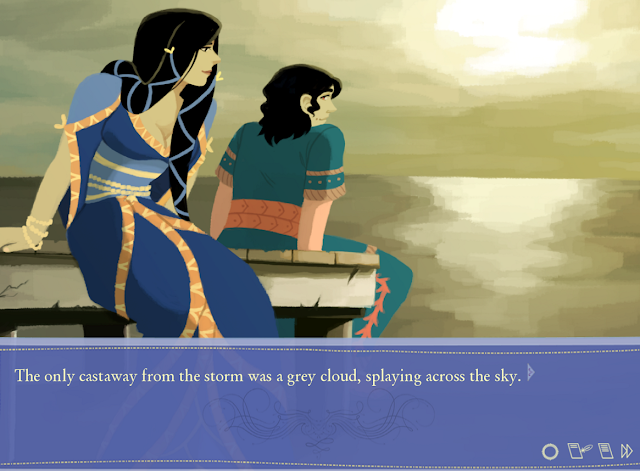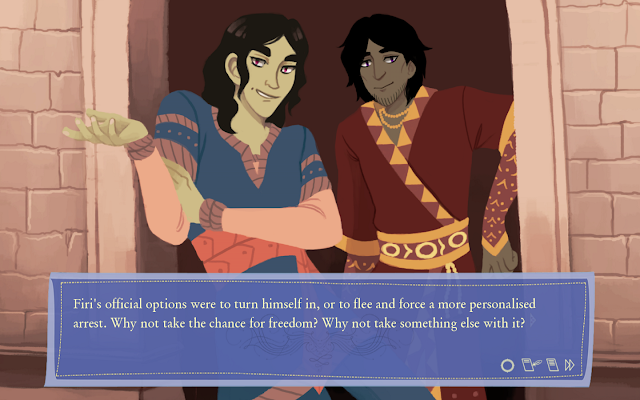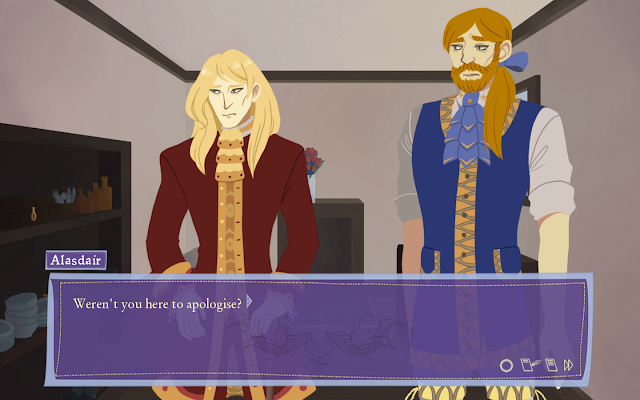Review by Harvard L.
When you think of 18th Century Scotland, the mind naturally conjures up images of blue faced warriors clamouring for freedom charging across rugged highlands. Inverness Nights, developed by New Zealand indie outfit Kitsubasa, aims for a more subdued view of the era. It’s a gripping visual novel revolving around three central characters, their clashing personalities and a touch of the supernatural. Most visual novels will require some slowing down to enjoy the nuances of the story, but this one especially so – the writing is crisp and drives powerful characterisation, and the game’s fascination with the art of narration leads to a complex plot that is as poignant as it is unpredictable.
The game opens with Tristam saving the life of Alasdair from the aftermath of a bloody battle. Tristam is a tailor and a kind, if sarcastic, person but his altruism seems to have landed him in hot water with the man he rescued. To add to the matter, a mysterious woman named Shell appears with exotic silks and a request to make a dress – but of course she is not quite as she seems. Each of the characters is interesting in their own right, and the game’s various routes shed light on their backstories, motivations and futures.
The writing is very well done, with an elegant, regal tone that draws the audience right into the historical setting. Characters speak to each other realistically, with some humorous moments thrown in, but Inverness Nights really hits its stride in moments of conflict. Kitsubasa also holds a clear fascination with the nature of storytelling itself – there is a significant story-within-a-story built into the narrative, and the ramifications of this tale begin to have effects on the player’s belief of the game’s events. Inverness Nights isn’t really one story, but rather multiple ones, with interconnecting narratives and vastly different outcomes depending on interpretation.
I also have a lot of respect for the way Tristam’s healing magic is woven into the story. Rather than use the supernatural as a means to create drama or magically solve difficult scenarios, Inverness Nights uses a background of myth and magic to illuminate the real and relatable struggles faced by Tristam, Alasdair and Shell. There are some things that even healing wizardry can’t fix, and this isn’t a game which shies away from conflict. It’s this realistic outlook on the human condition which makes the narrative so powerful, and the endings so satisfying. The player realises that a conclusion must be reached, and even if it’s not the perfect one, it’s the journey they took to reach it, the decisions they made and the people they touched which make it all worthwhile.
There’s also this one perfect violin piece which gently ushers in some moments of pristine beauty – the whole soundtrack is worth singing praises, but once you hear the solitary violin you’ll be utterly entranced. For an indie visual novel, the production values are remarkably high, and never did I feel that the story’s lofty developments were hindered by the skill of the craftspeople making it. I did have trouble getting used to the art style at first – it’s a more Western-influenced aesthetic heavy on block colours, but once I started unlocking a few CG’s I warmed up to it.
I found that the only thing hampering the game was quality-of-life issues likely to be more endemic to the RenPy engine used to build the game, rather than the developers themselves. I wish that colour-coded dialogue had been implemented, for example, because it was sometimes difficult to differentiate the speech between characters. A lack of a story log as well as a narrative flow chart forces the player to be diligently attentive, as clicking too quickly might result in crucial dialogue being skipped. Those more attuned to the Japanese style of visual novel design (where the True End is hidden behind a bunch of arbitrary event flags masquerading as simple choices) might be confused by the system used by Kitsubasa which, as mentioned before, guides the reader towards the route they themselves show interest in. There is a handy function to quickly scroll through text which you’ve already experienced on a previous playthrough, but the dialogue is snappy enough that it’s worth a second read.
Inverness Nights is a visual novel which packs a surprising amount of punch for its 4-5 hour runtime, since it doesn’t waste your time with padding and uses every word to its advantage. By focusing on a few core characters and examining their dynamics and struggles from a variety of angles, Kitsubasa demonstrates a deft talent in representing complex relationships in all their beauty. Inverness Nights tells a unique, unpredictable and touching story which encourages audiences to foster an empathy for its main cast, and the result is an emotional payoff which cannot be understated.
– Harvard L.
Contributor










